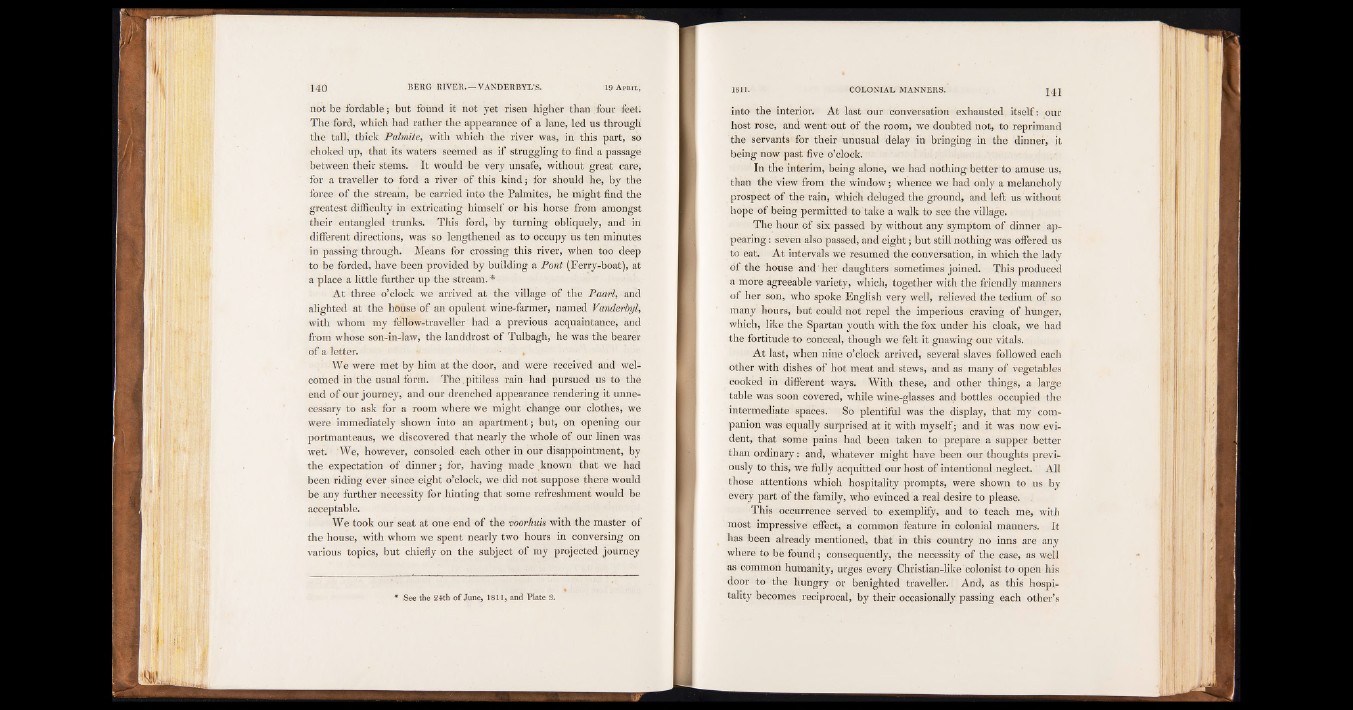
not be fordable; but found it not yet risen higher than four feet
The ford, which had rather the appearance of a lane, led us through
the tall, thick Palmite, with which the river was, in this part, so
choked up, that its waters seemed as if struggling to find a passage
between their stems. It would be very unsafe, without great care,
for a traveller to ford a river of this kind; for should he, by the
force of the stream, be carried into the Palmites, he might find the
greatest difficulty in extricating himself or his horse from amongst
their entangled trunks. This ford, by turning obliquely, and in
different directions, was so lengthened as to occupy us ten minutes
in passing through. Means for crossing this river, when too deep
to be forded, have been provided by building a Pont (Ferry-boat), at
a place a little further up the stream. *
At three o’clock we arrived at the village of the Paarl, and
alighted at the house of an opulent wine-farmer, named Vanderbyl,
with whom my fellow-traveller had a previous acquaintance* and
from whose son-in-law, the landdrost of Tulbagh, he was the bearer
of a letter.
We were met by him at the door, and were received and welcomed
in the usual form. The. pitiless rain had pursued us to the
end of our journey, and our drenched appearance rendering it unnecessary
to ask for a room where we might change our clothes, we
were immediately shown into an apartment; but, on opening our
portmanteaus, we discovered that nearly the whole of our linen was
wet. We, however, consoled each other in our disappointment, by
the expectation of dinner; for, having made known that we had
been riding ever since eight o’clock, we did not suppose there would
be any further necessity for hinting that some refreshment would be
acceptable.
We took our seat at one end of the voorhuis with the master of
the house, with whom we spent nearly two hours in conversing on
various topics, but chiefly on the subject of my projected journey
* See the 24th of June, 1811, and Plate 8.
into the interior. At last our conversation exhausted itself: our
host rose, and went out of the room, we doubted not, to reprimand
the servants for their unusual delay in bringing in the dinner, it
being now past five o’clock.
In the interim, being alone, we had nothing better to amuse us,
than the view from the window; whence we had only a melancholy
prospect of the rain, which deluged the ground, and left us without
hope of being permitted to take a walk to see the village.
The hour, of six passed by without any symptom of dinner appearing
: seven also passed, and eight; but still nothing was offered us
to eat. At intervals we resumed the conversation, in which the lady
of the house and her daughters sometimes joined. This produced
a more agreeable variety, which, together with the friendly manners
of her son, who spoke English very well, relieved the tedium of so
many hours, but could not repel the imperious craving of hunger,
which, like the Spartan youth with the fox under his cloak, we had
the fortitude to conceal, though we felt it gnawing our vitals.
At last, when nine o’clock arrived, several slaves followed each
other with dishes of hot meat and stews, and as many of vegetables
cooked in different ways. With these, and other things, a large
table was soon covered, while wine-glasses and bottles occupied the
intermediate spaces. So plentiful was the display, that my companion
was equally surprised at it with myself; and it was now evident,
that some pains had been taken to prepare a supper better
than ordinary: and, whatever might have been our thoughts previously
to this, we fully acquitted our host of intentional neglect. All
those attentions whioh hospitality prompts, were shown to us by
every part of the family, who evinced a real desire to please. .
This occurrence served to exemplify, and to teach me, with
most, impressive effect, a common feature in colonial manners. It
has been already mentioned, that in this country no inns are any
where to be found; consequently, the necessity of the case, as well
as common humanity, urges every Christian-like colonist to open his
door to the hungry or benighted traveller. And, as this hospitality
becomes reciprocal, by their occasionally passing each other’s